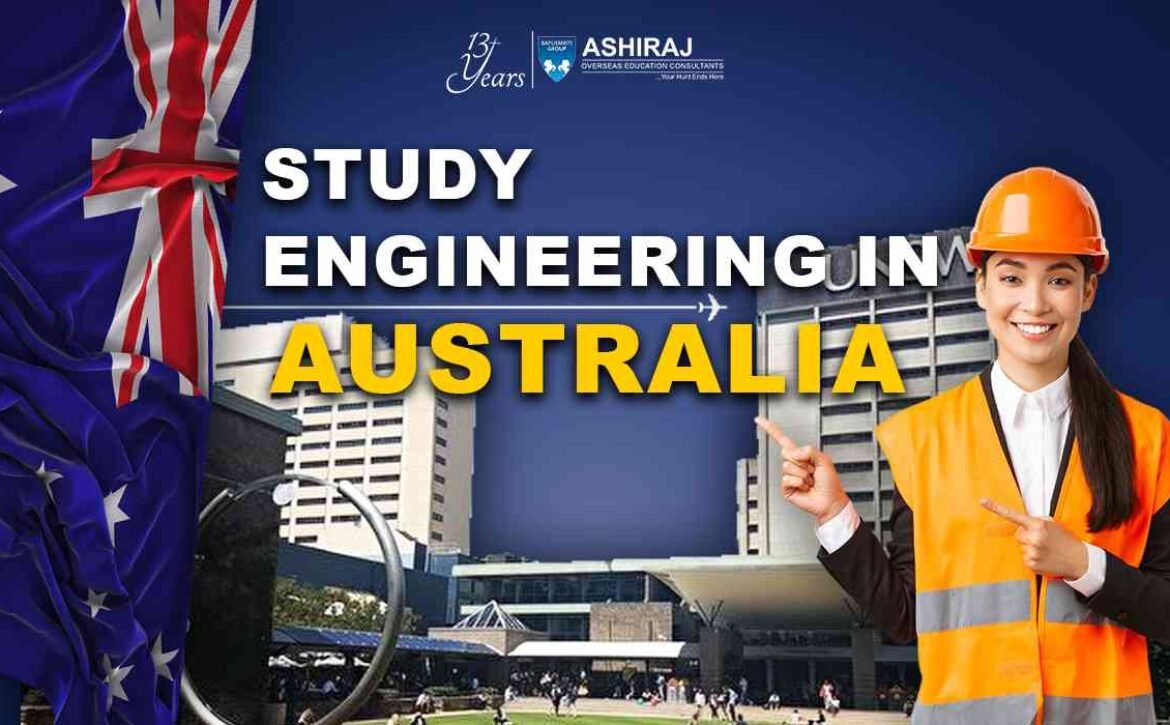
Engineering in Australia
Engineering in Australia is a dynamic and thriving field that encompasses a wide range of disciplines and industries. From civil and mechanical engineering to aerospace and biomedical engineering, Australia offers diverse opportunities for professionals and students alike. The country’s robust infrastructure projects, innovative research institutions, and commitment to sustainability make it an attractive destination for aspiring engineers worldwide.
In recent years, Engineering in Australia has experienced significant growth and development, driven by technological advancements and the increasing demand for skilled professionals. The Australian government’s investment in infrastructure projects, renewable energy initiatives, and cutting-edge research has further propelled the engineering sector forward. With world-class universities offering top-tier engineering programs and a strong emphasis on practical, hands-on learning, Australia provides an enriching environment for individuals pursuing careers in engineering. As the global demand for sustainable solutions and technological innovation continues to rise, Engineering in Australia remains at the forefront of addressing complex challenges and shaping the future of various industries.
Why to Study Engineering in Australia?
- Quality Education: Australian universities are renowned for their high-quality engineering programs, recognized globally for excellence in teaching and research.
- Cutting-edge Facilities: Engineering students in Australia have access to state-of-the-art laboratories, workshops, and research centres equipped with the latest technology and equipment.
- Industry Connections: Many Australian universities have strong ties with industry partners, offering students opportunities for internships, work placements, and industry-sponsored projects.
- Diverse Specializations: Australia offers a wide range of engineering specializations, including civil, mechanical, electrical, aerospace, and environmental engineering, allowing students to pursue their interests and passions.
- Global Recognition: Engineering degrees from Australian universities are highly respected worldwide, providing graduates with excellent career prospects and opportunities for international employment.
- Practical Learning: Australian engineering programs emphasize hands-on learning and real-world applications, preparing students for the challenges of the industry.
- Multicultural Environment: Studying engineering in Australia exposes students to a multicultural environment, fostering collaboration, diversity, and cross-cultural understanding.
- Quality of Life: Australia is known for its high standard of living, safety, and quality healthcare, making it an attractive destination for international students pursuing their engineering education.
In conclusion, studying engineering in Australia offers students a unique opportunity to receive world-class education, gain practical experience, and prepare for successful careers in the global engineering industry.
Top Universities to Study Engineering in Australia
University | QS World University Rankings 2023 | Type of University | Average Annual Fees | Programs Offered |
University of Melbourne | 1st | Public | $32,000 | Civil, Mechanical, Electrical, |
Aerospace Engineering | ||||
Australian National | 2nd | Public | $30,000 | Civil, Mechanical, Electrical, |
University (ANU) | Computer Engineering | |||
University of Sydney | 3rd | Public | $33,000 | Civil, Mechanical, Electrical, |
Biomedical Engineering | ||||
University of New South | 4th | Public | $31,000 | Civil, Mechanical, Electrical, |
Wales (UNSW Sydney) | Environmental Engineering | |||
University of Queensland | 5th | Public | $29,000 | Civil, Mechanical, Electrical, |
(UQ) | Chemical Engineering |
Australia boasts some of the world’s top universities for engineering, offering diverse programs and research opportunities. The University of Melbourne ranked first in the QS World University Rankings 2023, is renowned for its excellence in Civil, Mechanical, Electrical, and Aerospace Engineering. The Australian National University (ANU) follows closely, providing programs in Civil, Mechanical, Electrical, and Computer Engineering. The University of Sydney and the University of New South Wales (UNSW Sydney) offer comprehensive engineering programs, including Biomedical and Environmental Engineering, respectively. The University of Queensland (UQ) rounds up the top five, excelling in Civil, Mechanical, Electrical, and Chemical Engineering. With their strong academic reputation and commitment to innovation, these universities are prime destinations for students seeking quality engineering education in Australia.
Course Curriculum for Engineering in Australia
- Core Engineering Subjects: Engineering programs in Australia typically include core subjects such as mathematics, physics, and mechanics to build a strong foundation in fundamental principles.
- Specialized Tracks: Students have the opportunity to choose from various specialized tracks such as civil, mechanical, electrical, and chemical engineering, allowing them to focus on their areas of interest.
- Practical Laboratories: Hands-on laboratory sessions form an integral part of the curriculum, providing students with practical experience in applying theoretical concepts to real-world problems.
- Industry Projects: Many engineering programs incorporate industry projects and internships, enabling students to gain valuable experience and establish connections within the industry.
- Focus on Sustainability: With a growing emphasis on sustainability, engineering curricula in Australia often include courses on renewable energy, environmental engineering, and sustainable design practices.
- Research Opportunities: Students may engage in research projects and collaborations with faculty members, contributing to advancements in engineering knowledge and innovation.
- Professional Development: Engineering programs also focus on developing students’ professional skills such as communication, teamwork, and project management, preparing them for successful careers in the field.
- Adaptation to Technological Trends: Curricula are regularly updated to align with technological advancements and industry trends, ensuring that graduates are equipped with the latest skills and knowledge.
Engineering in Australia offers a comprehensive curriculum that combines theoretical learning with practical experience, preparing students to tackle complex engineering challenges and contribute to global innovation and development.
Eligibility Criteria & Admission Requirements for Engineering in Australia
- IELTS or TOEFL Scores: International students are typically required to demonstrate proficiency in English by submitting IELTS or TOEFL scores. Common minimum scores include 6.5 for IELTS and 90 for TOEFL.
- GRE or GMAT Scores: Some universities may require applicants to submit GRE or GMAT scores as part of their application. While specific score requirements vary, competitive scores often range from 310 to 330 for GRE and 600 to 700 for GMAT.
- Passport & Student Visa: Prospective students must possess a valid passport and obtain a student visa to study in Australia. The visa application process includes providing proof of enrollment, financial stability, and meeting health and character requirements.
- Academic Certificates: Applicants must submit academic transcripts and certificates demonstrating completion of secondary education or equivalent qualifications. Additionally, some universities may require specific prerequisites in mathematics, physics, and other relevant subjects.
- Work Experience: While not always mandatory, certain engineering programs may prefer applicants with relevant work experience in the field. Work experience can strengthen an applicant’s candidacy and provide valuable insights into the industry.
Test | Minimum Score |
IELTS | 6.5 |
TOEFL | 90 |
GRE | 310 – 330 |
GMAT | 600 – 700 |
Meeting the eligibility criteria is essential for prospective engineering students to secure admission to Australian universities and embark on a rewarding academic journey in Engineering in Australia.
Documents Required for Studying Engineering in Australia
- Passport: A valid passport is essential for international students applying to engineering programs in Australia. It serves as identification and is required for visa processing.
- Two Letters of Recommendation (LOR): LORs from teachers, professors, or employers provide insight into the applicant’s academic and professional abilities, enhancing their application for engineering programs.
- Statement of Purpose (SOP): The SOP outlines the applicant’s academic background, career goals, and reasons for choosing the specific engineering program. It helps admissions committees assess the applicant’s suitability for the program.
- Curriculum Vitae (CV): A detailed CV highlights the applicant’s academic achievements, extracurricular activities, work experience, and relevant skills, providing a comprehensive overview of their qualifications.
- Official High School Transcripts and Educational Certificates: Transcripts and certificates from high school or equivalent institutions verify the applicant’s academic performance and qualifications.
- Work Experience Certificate: If applicable, a work experience certificate provides evidence of the applicant’s professional experience in engineering or related fields.
- Proof of Financial Resources: Applicants must demonstrate sufficient financial resources to cover tuition fees, living expenses, and other costs associated with studying and living in Australia.
Ensuring the timely submission of these documents is crucial for a smooth application process and admission to Engineering in Australia programs.
Admission Process for Engineering in Australia
- Research Universities: Explore engineering programs offered by various universities in Australia. Consider factors such as program accreditation, faculty expertise, and research opportunities.
- Check Eligibility Criteria: Review the admission requirements for each university, including academic qualifications, English language proficiency tests (IELTS, TOEFL), and standardized tests (GRE, GMAT).
- Prepare Documents: Gather required documents, including academic transcripts, letters of recommendation, statement of purpose, curriculum vitae, passport, and proof of financial resources.
- Submit Application: Complete the online application form for your chosen universities. Ensure all required documents are uploaded accurately and within the specified deadlines.
- Pay Application Fees: Pay the application fees as per the university’s guidelines. Fees may vary among institutions.
- Wait for Decision: Wait for the university’s decision on your application. This may take several weeks to months, depending on the university’s admission timeline.
- Receive Offer Letter: If accepted, you will receive an offer letter outlining the terms of admission, including tuition fees, start date, and any conditions you must meet.
- Accept Offer and Obtain Visa: Accept the offer of admission and proceed to apply for a student visa. Follow the visa application process, including providing biometric information and attending an interview if required.
- Prepare for Arrival: Make necessary arrangements for accommodation, travel, and orientation upon arrival in Australia.
Following these steps diligently will help you navigate the admission process smoothly and secure a spot in Engineering in Australia programs.
“Education is the most powerful weapon which you can use to change the world.”
Nelson Mandela
Cost of Engineering Course in Australia
- Tuition Fees: Tuition fees for engineering programs in Australia vary across universities and courses. On average, international students can expect to pay between $25,000 to AUD 40,000 per year.
- Living Expenses: The cost of living in Australia depends on factors like location and lifestyle. On average, students should budget around $20,000 to AUD 25,000 per year for accommodation, food, transportation, and other personal expenses.
- Health Insurance: International students are required to have health insurance. The cost can range from $500 to AUD 800 per year, depending on the coverage and provider.
- Books and Supplies: Budget for textbooks, stationery, and other study materials, which may cost around $500 to AUD 1,000 per year.
- Visa Fees: Student visa application fees are approximately AUD 620. It’s essential to budget for this expense when planning to study engineering in Australia.
- Miscellaneous Costs: This includes costs for public transportation, phone bills, and other miscellaneous expenses. Budgeting an additional $2,000 to AUD 3,000 per year is advisable.
Considering these factors, the estimated annual cost for an international student pursuing engineering in Australia ranges from $48,620 to AUD 69,620. Students must plan and manage their finances effectively throughout their academic journey.
Scholarships for Engineering Courses in Australia
Scholarship Name | Amount Available | Application Deadline |
Australia Awards Scholarships | Full tuition fees, living allowance, and health coverage | Varies by country |
Destination Australia Scholarships | Up to $15,000 per year | Varies by institution |
Endeavour Postgraduate Scholarships | Up to $272,500 for tuition, travel, and establishment allowances | June-July |
University-specific Scholarships | Varies by institution | Varies by institution |
Engineering Scholarships for International Students | Up to $10,000 per year | Varies by university |
Scholarships for engineering students in Australia offer financial assistance and opportunities for international students to pursue their studies. The Australia Awards Scholarships cover full tuition fees, living expenses, and health coverage, with deadlines varying by country. The Destination Australia Scholarships provide up to $15,000 per year and have application deadlines determined by each institution. The Endeavour Postgraduate Scholarships offer up to $272,500 for tuition, travel, and establishment allowances, with applications typically due in June or July. Additionally, universities offer their scholarships with varying amounts and deadlines. Engineering-specific scholarships for international students can provide up to $10,000 per year, with application deadlines varying by university. These scholarships play a crucial role in making engineering education accessible and affordable for students pursuing Engineering in Australia.
Career Opportunities After Engineering in Australia
Job Profile | Average Salary (AUD) |
Civil Engineer | $70,000 – $110,000 |
Mechanical Engineer | $75,000 – $120,000 |
Electrical Engineer | $80,000 – $130,000 |
Software Engineer | $80,000 – $140,000 |
Aerospace Engineer | $85,000 – $150,000 |
Engineering graduates in Australia enjoy diverse career opportunities across various sectors. Civil engineers play a critical role in infrastructure projects, with salaries ranging from $70,000 to AUD 110,000. Mechanical engineers contribute to industries like manufacturing and automotive, earning between $75,000 to AUD 120,000 annually. Electrical engineers, essential in power generation and electronics, command salaries between $80,000 to AUD 130,000. Software engineers, integral to the technology sector, earn from $80,000 to AUD 140,000. Aerospace engineers, involved in aviation and defense, have salaries ranging from $85,000 to AUD 150,000. These career options reflect the diversity and potential for growth within the engineering field in Australia. As the demand for skilled engineers continues to rise, graduates can expect rewarding opportunities in Engineering in Australia across various industries with competitive salaries.
Frequently Asked Questions About Engineering in Australia
Some top universities for engineering in Australia include the University of Melbourne, Australian National University (ANU), University of Sydney, University of New South Wales (UNSW Sydney), and the University of Queensland (UQ).
The average cost of studying engineering in Australia ranges from $25,000 to AUD 40,000 per year for tuition, excluding living expenses.
Yes, there are various scholarships available, including Australia Awards Scholarships, Destination Australia Scholarships, and university-specific scholarships.
Eligibility criteria typically include academic qualifications, English language proficiency tests (IELTS, TOEFL), and, in some cases, standardized tests like GRE or GMAT.
Most undergraduate engineering programs take around 3 to 4 years to complete, while postgraduate programs can take 1 to 2 years.
The job market for engineering graduates in Australia is robust, with opportunities in various sectors such as construction, technology, and manufacturing.
Yes, international students can work part-time during their studies and full-time during scheduled breaks.
While not always mandatory, some programs may prefer applicants with relevant work experience.
Common English language proficiency tests accepted are IELTS and TOEFL, with varying score requirements depending on the university and program.
After receiving an offer of admission, students can apply for a student visa by providing necessary documents, including proof of enrollment and financial stability.




